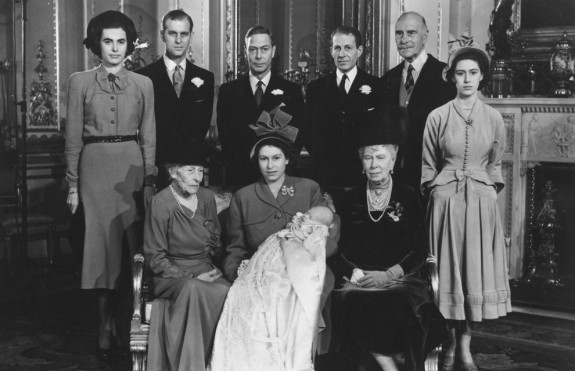The Windsors over in the U.K. are baptizing another baby today—the image above shows the happy family rejoicing at the christening of Prince Charles—and the BBC has some interesting insight into how the ritual has evolved:
Prince George’s christening on Wednesday comes 31 years after his father Prince William in 1982. Here are ways in which baptisms have changed since then.
1. There are fewer christenings
George’s christening is the exception rather than the rule. And not just because he’s a royal.
Although christenings were already in decline, one in three infants was still baptised into the Church of England in 1980. By 2011 that had fallen to just over one in 10. The overall number of baptisms – of people of all ages – witnessed a similar decline, from 266,000 in 1980 to 140,000 in 2011.
It’s a similar story in the Catholic Church, although the major drop-off in baptisms happened between 1964 and 1977, when the number halved. There’s been a far gentler downward trend over the past three decades, recently stabilising at about 60,000 baptisms a year.
2. But more godparents
Christenings may have dwindled but the number of godparents per child has increased. Prince George will have seven. Elizabeth Hurley’s son apparently has six godfathers.
And it’s not just a celebrity fad.
“In practice it seems to be changing,” says the Archdeacon of Leicester, Tim Stratford, although there’s been no doctrinal change. That’s because both the Church of England and the Catholic Church only have minimum requirements, of three and one respectively.
“It used to be the minimum that was the issue,” says Stratford. “Now the issue for a lot of clergy is that often people are choosing a lot of godparents.
“The registers we have, for instance, often only have four spaces to put godparents’ names but people may be choosing six or eight.”
3. …who are not necessarily religious
A godparent is supposed to mentor the child in their faith. And the rules haven’t changed.
“Because of what godparent strictly means, we only have practising Catholics as godparents, and fellow Christians as ‘special witnesses’,” says Fr Paul Keane, a parish priest in Essex.
The Church of England does not distinguish between denominations, says Stratford.
“The only requirement for godparents is that they should have been baptised. A Muslim or a Hindu cannot strictly speaking be a godparent, nor can a secularist who has not been baptised.”
While the Church does insist on godparents being baptised, that may not be uniformly enforced across all parishes.
Stratford acknowledges that in practice the godparent’s role is broader than just a religious one.
“Providing the child has enough godparents, there’s nothing to stop people being ‘honorary godparents’, without technically being one. That is fairly common in the Church,” he says, explaining that the Church is soon to advise using the term “supporting friend”.
“It’s the Church trying to catch up with emerging trends in society.”
There’s much more. Read the whole list.












